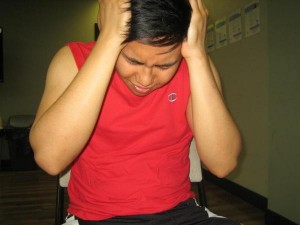Existence of headaches in children is not a cause for alarm. Children often develop different varieties such as, migraines, short-term headaches due to stress or chronic headaches.
If these headaches persist for an undesirable amount of time, consulting a doctor is your best move.
Symptoms
Migraines last only about an hour as compared with the average of around 4-70 hours in adults. It causes a throbbing and painful experience, usually on one side of the head. It also causes irritability towards sounds or bright light; in severe cases it causes nausea, vomiting and abdominal pain.
Stress related headaches give a sensation of tightness. These do not affect their physical activity much, however, children may be seen as wanting to take extra naps or not wanting to take part in playing games. It lasts about thirty minutes to around a few days.
Cluster pain, rare in children under the age of 10; causes strong pain which is 
Chronic daily headaches are the type that last for a long time. Its symptoms may be combined with the type of pains mentioned previously.
Seeking Medical Advice
You should seek medical advice if:
- The pain felt is severe.
- It persists for more than a week.
- There is a presence of symptoms other than just pain in the head.
- It is consistent and due to an injury.
Treatment
- Medication
To get rid of the pain, drugs such as; Ibuprofen, which include Advil or Motrin; Acetaminophen, which includes Tylenol can be used to help decrease the pain.
Aspirin is usually okay to use on children over the age of 2, however if children are recovering from other illnesses they are best avoided, unless approved by your doctor. If the child is 12 or more medication like Sumatripan (for example, Imitrex) is used. If symptoms such as nausea are present it is best to use anti-nausea medication like Promethamize, which needs a doctor’s prescription. It should be remembered however, that the excessive usage of medication could also start headaches.
- Therapy
Events in life and depression leads to headaches. Therapy works best here, it includes helping a child to learn how to calm themselves from possible anxiety and helping loosen up their tense muscles. Biofeedback is a method used to help the child take control of his own body, it monitors the heart rate for example and helps the child to control it. Cognitive behavioral therapies aim to make them see the world in a positive perspective.
Lastly, it should be remembered that the best thing for your child, in case of serious headaches is consulting a doctor. It is the best and the safest option. However, depending on cause, it is always good to focus on extra rest and a healthy diet for your child.
